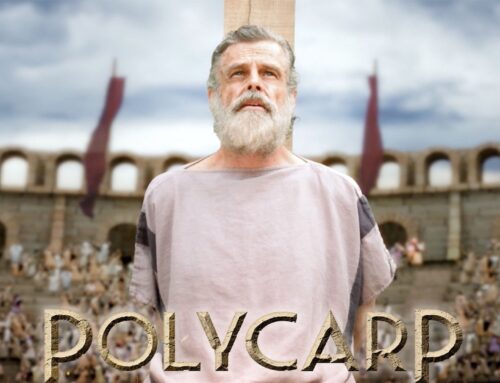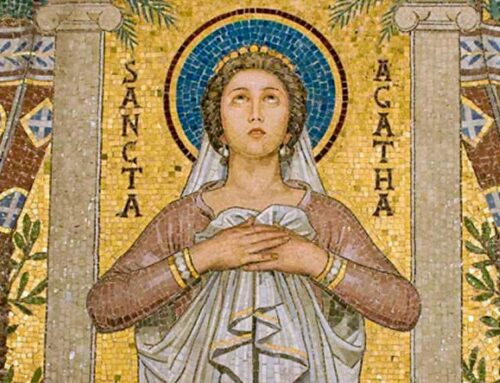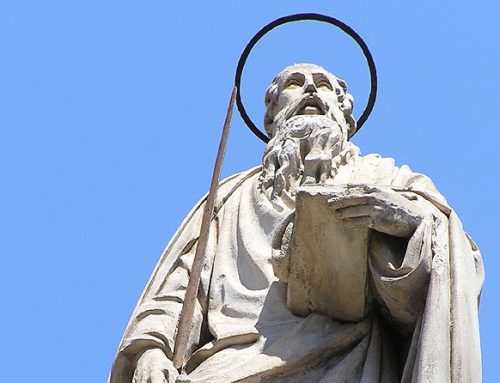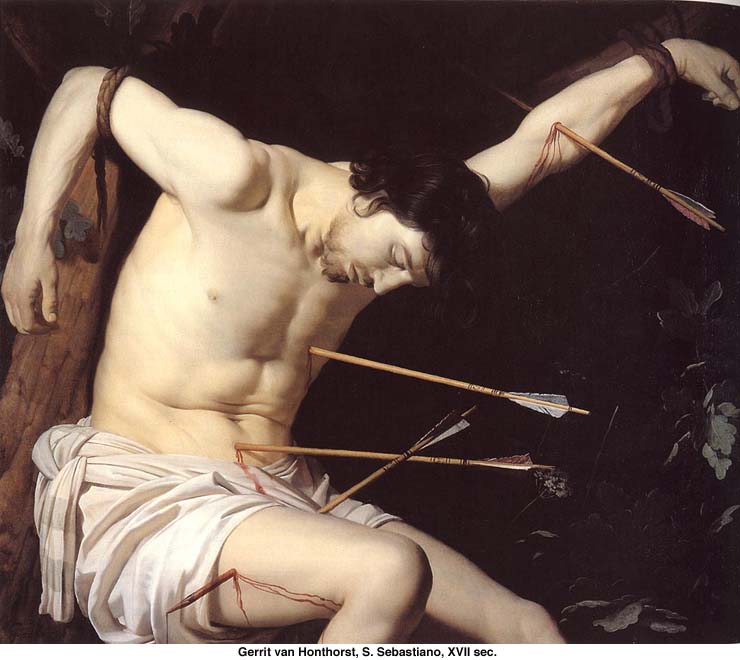The life of faith can always grow. Peter will continue fighting against fear, against an excessively human view of his mission, against his ignorance of the value of the Cross and suffering
The life of faith can always grow. Peter will continue fighting against fear, against an excessively human view of his mission, against his ignorance of the value of the Cross and suffering
Our Lady’s life is a model of faith for every Christian, since her whole life was directed to God and to carrying out his will. “Treasuring every memory in her heart (cf. Lk 2:19, 51), she passed them on to the Twelve, assembled with her in the Upper Room to receive the Holy Spirit (cf. Acts1:14; 2:1-4).”[1] Encouraged by our Lady’s example and closeness, the Apostles gave valiant and fruitful witness to the faith, and spread the Gospel all over the world.
Nevertheless, before reaching this point, the Apostles had to travel a long road and mature in their faith. While accompanying our Lord on this earth, their generosity (they had left everything to follow Jesus) was still compatible with faith that was weak or sometimes too human, as our Lord himself sometimes reproached them.[2]Let us now look at the Apostles and especially at St. Peter, head of the apostolic college, in order to accompany him on his journey to a mature faith. It will be a new opportunity to accept the invitation to “an authentic and renewed conversion to the Lord, the one Saviour of the world.”[3]
The path of faith
We read in the Gospel that after the multiplication of loaves, our Lord made the disciples get into the boat and go before him to the other side while he dismissed the crowds.[4] The Apostles took the boat and began to cross the
It is not difficult to imagine the confused feelings that must have reigned in the Apostles’ hearts. They had just witnessed a most extraordinary happening: five thousand people fed with just five loaves and two fishes. And the miracle had been carried out through their own hands while they distributed the little food they had. All they had to do was obey Jesus. But the joy and euphoria of that event had vanished. Now, just a few hours later, the Apostles found themselves without Jesus, struggling against the storm.
Jesus was, apparently, far away. St. John Chrysostom, commenting on this passage, pointed out that, by letting them go on ahead alone, Jesus wanted to stir up in them “a greater desire and continual memory of him.”[6] He wanted to make them understand that physical distance is only apparent separation, because he always wants to—and can!—be close to his disciples. That is why in the fourth watch of the night he came to them, walking on the sea.[7] How was that possible? “Who can walk on the sea except he who is the Creator of the universe? He of whom the Holy Spirit had announced through Job: ‘He alone stretched out the heavens and trampled the waves of the sea’.”[8] Those in the boat were terrified and started to call out: It is a ghost![9] They were not expecting the apparition; they did not know yet that he wanted to be with them wherever they were. But Jesus restored their calm: Take heart, it is I; have no fear.[10]
This was when Peter’s character manifested itself. On hearing these words, he asked to do something which by nature was impossible: Lord, if it is you, bid me come to you on the water.[11] The request was in complete contrast with the panic that had broken out in the boat previously, and it showed the love and faith of the Prince of the Apostles. He wanted to get to our Lord as soon as possible, and Jesus, accepting this desire, called out: Come![12] This is what our Lord wants from us: a ready heart, a willing heart, even though we may be weak. As with all the marvels that God works for us human beings, he needs our little contribution, as he did with the loaves and the fishes.
St. Peter wanted to reach our Lord as soon as possible. He wanted to feel safe beside him, but he did not really know what he was asking for. His love led him to jump onto the water and start walking; but soon he let fear take over his heart, and he started to sink.[13] How did his change of attitude come about? Why did he get so scared, when he had seen that Jesus had fulfilled his word, and that he, Peter, was walking on the water? The Gospel writer tells us that he started to get frightened on seeing that the wind was very strong;[14] so much so he did not know if he could keep his footing on the stormy sea. Peter was afraid he would sink and drown, which may seem absurd when we have seen that he was already doing something impossible. It was as though he lost sight of the fact that the miracle was only possible because Jesus had called him; that it was Jesus who was supporting him and allowing him to walk on the waters. He needed other reassurances, including that of being able to keep his feet and stand up to the wind with his own strength. And when he realized that this confidence was unfounded, he stopped believing in Jesus’ word and started to sink.
In Christian life, an important part of maturing in our faith is learning to pay heed only to Jesus’ word, and not letting ourselves be brought down by the awareness of our limitations. “Do you see? With Him you could do it. Why are you surprised? Be convinced there is nothing to be surprised about. If you trust in God—really trust—things work out easily. And what is more, you always go further than you imagined you could.”[15] It is because God does things “sooner, more and better.”[16]
Nevertheless, in spite of his doubts, Peter gives us a lesson. His faith and trust may be almost blinded by terror, but he made a last effort to throw himself into Jesus’ arms:Lord, save me![17] And Jesus responded instantly: he held him up and brought him to the boat.[18] “He calms the sea. And they were all filled with awe.”[19] It is the awe that is felt in the face of God’s marvels, the joyful bewilderment that comes from experiencing the action of the Holy Spirit and grace. Hence, as the Holy Father teaches us, when faced with sin, remorse, or fear, “we must always look at the Lord, contemplate the Lord;” “yes, we are weak, but we must be courageous in our weakness,”[20] because our Lord is always waiting for us. “A smile, a word, a gesture, a little bit of love is enough for him to pour out his grace bountifully on the soul of his friend.”[21] On experiencing our own weakness, we can say to our Lord, stretch forth thy hand from on high, rescue me and deliver me from the many waters.[22]
Without losing heart
Peter learned a lesson. He doubted, and at the same time he discovered that his love and his faith were not as strong as he had thought. These simple lessons enabled the Apostle to know himself better and realize that his love was imperfect, that he still thought too much about himself. “When our Lord called the first Apostles they were busy mending their broken nets by the side of an old boat. Our Lord told them to follow him and statim, immediately, they left everything, relictis omnibus: everything! And they followed him. Sometimes, though we wish to imitate them, we find we don’t manage to leave everything, and there remains some attachment in our heart, something wrong in our life which we’re not willing to break with and offer it up to God.”[23]
What sort of man is this, that even the winds and sea obey him?[24] By his presence, words and deeds, Christ kindles the love and faith of those he will afterwards send out all over the world. In Caesarea Philippi, Peter confesses clearly that Jesus is the promised Messiah and that he is the Son of God: You are the Christ, the Son of the living God.[25] But it is good to remember that “when he confesses his faith in Jesus, he does not do it through his human ability, but rather because he has been conquered by the grace that Jesus irradiates, through the love that is felt in his words and seen in his gestures: Jesus is the love of God in person!”[26]
Nevertheless, Peter’s confession does not mean that his faith is now perfect. In fact, a little later we see Peter trying to discourage Jesus from his Passion,[27] thus gaining a reprimand from the Master. The life of faith can always grow. Peter will continue fighting against fear, against an excessively human view of his mission, against his ignorance of the value of the Cross and suffering. He will ask about a possible reward for those who, like himself, have left everything to follow the Lord;[28] he will get scared on
Nevertheless, in all these cases the Prince of the Apostles will return to Jesus. He will accept his reproaches, meet his eyes, and have trust in his mercy. Faith is a path to humility. It implies “trusting oneself to a merciful love, which always accepts and pardons, supports and directs our lives, and which shows its power by its ability to make straight the crooked lines of our history.”[30]
Faith is true knowledge, light, which also makes us aware of our own smallness and destroys false conceptions and self-delusions. Faith makes us humble and simple; it prepares the prime matter that God needs for making us saints, so that we can help him transform the world. And thus “Peter, too, must learn that he is weak and in need of forgiveness. Once his attitude changes and he understands the truth of his weak heart, the heart of a believing sinner, he weeps in a fit of liberating repentance. After this weeping he is finally ready for his mission.”[31]
Realizing our personal weakness, seeing that our faith is not as strong as we would like, should not worry us. Our Lord wants our whole heart, and it does not matter to him if it is weak. God is happy if we give him all we can. In a way, this was precisely the last lesson that Jesus had for St. Peter. After the Resurrection Jesus went to meet his Apostles beside the
“From that day, Peter ‘followed’ the Master with a precise awareness of his own fragility, but this awareness did not discourage him. Indeed, he knew that he could count on the presence of the Risen One beside him. From the naïve enthusiasm of his initial acceptance, passing though the sorrowful experience of denial and the weeping of conversion, Peter succeeded in entrusting himself to that Jesus who adapted himself to his poor capacity for love. And in this way he shows us the way, notwithstanding all of our weakness. We know that Jesus adapts himself to this weakness of ours. We follow him with our poor capacity to love and we know that Jesus is good and he accepts us. It was a long journey for Peter that made him a trustworthy witness, the ‘rock’ of the Church, because he was constantly open to the action of the Spirit of Jesus.”[33] Let us ask St. Peter every day, with more faith and admiration, to intercede for us: Sancte Petre, ora pro nobis!
[1] Benedict XVI, Motu Proprio Porta Fidei, 11 October 2011, no. 13
[2] See Mt 6:30; 8:26; 16:8 17:20; Lk 12:28
[3] Benedict XVI, Porta Fidei, no. 6
[4] Mt 14:22-23
[5] Mt 14:24
[6]
[7] Mt 14:25
[8] St. Chromatius of
[9] Mt 14:26
[10] Mt 14:27
[11] Mt 14:28
[12] Mt 14:29
[13] See Mt 14:30
[14] See Mt 14:30
[15] St. Josemaría, Furrow, 123
[16] St. Josemaría, Furrow, 462
[17] Mt 14:30
[18] See Mt 14:31-32
[19] Pope Francis, Daily Meditation, 2 July 2013
[20] Ibid.
[21] The Way of the Cross, Fifth station
[22] Ps 144[143]: 7
[23] St. Josemaría, The Forge, 356.
[24] Mt 8:27
[25] Mt 16:16
[26] Pope Francis, Angelus, 29 June 2013
[27] See Mt 16:22
[28] See Mt 19:27
[29] See Mt 26: 33-35
[30] Pope Francis, Encyclical Lumen Fidei, 29 June 2013, no. 13
[31] Benedict XVI, General Audience, 24 May 2006
[32] Jn 21:15
[33] Benedict XVI, General Audience, 24 May 2006








Leave A Comment
You must be logged in to post a comment.